Battling Ebola: Two doctors for a county of 85,000 people
Monrovia, Liberia (CNN) -- Meet Dr. Gobee Logan, the county health director for Bomi County in Liberia.
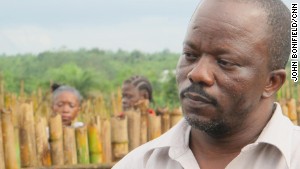
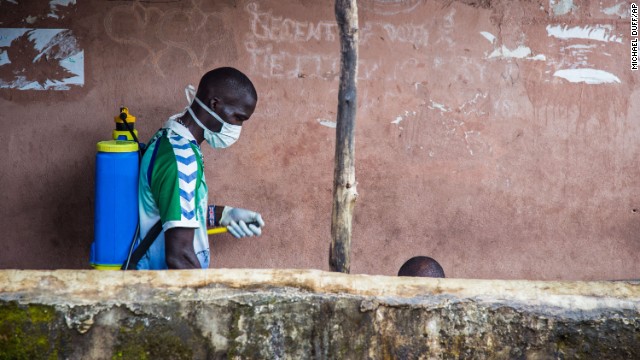 Photos: Ebola outbreak in West Africa
Photos: Ebola outbreak in West Africa
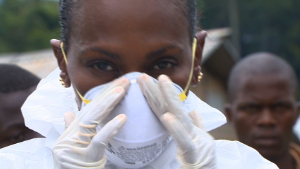 Avoiding Ebola: Bleach is 'best friend'
Avoiding Ebola: Bleach is 'best friend'
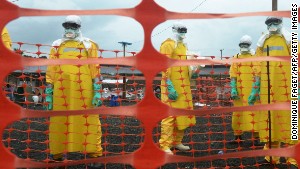
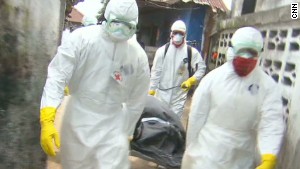
You have now met half the medical team in Bomi County.
There are two doctors in the entire county. I don't mean two doctors to treat Ebola patients but two doctors, period.
Two doctors to take care
of Ebola patients, plus the 100 patients in their general hospital, plus
the rest of the county. That's two doctors for about 85,000 people.
Logan doesn't complain,
even though he's been working around the clock since June, when the
first Ebola case appeared in this agricultural county.

Dr. Gobee Logan works around the clock to help fight Ebola in Bomi County, Liberia.
He would, however, like
an actual Ebola treatment center. He's been taking care of patients in a
holding facility, which has only 12 beds. Sometimes they have nearly
double that number, and patients overflow onto mattresses on the floor.
He can't send these patients to real Ebola treatment centers because they're all full.
 Photos: Ebola outbreak in West Africa
Photos: Ebola outbreak in West Africa
 Avoiding Ebola: Bleach is 'best friend'
Avoiding Ebola: Bleach is 'best friend'
Logan has been begging
the federal government for more than a month for an official Ebola
treatment unit, one with more beds and a quarantine area for people
who've come in close contact with Ebola patients but aren't sick.
My team and I -- senior
producer John Bonifield, senior photographer Orlando Ruiz and our
coordinator, Liberian journalist Orlind Cooper -- saw firsthand Tuesday
night just how much he needs a real hospital.
About 7 p.m., an
ambulance arrived at Logan's facility in Tubmanburg with five people
who, the day before, had washed the bodies of a mother and daughter who
had died of Ebola.
After they'd done the washing, their community kicked them out, Logan told us.
Now the five relatives
-- three adults, a 13-year-old and a 5-year-old -- were in the ambulance
in Ebola limbo. They couldn't go back home, and they couldn't go into
the facility because they might get infected.
By the light of a single
bulb outside the facility, Logan convened an impromptu meeting between
himself, county Superintendent Samuel Brown and acting county Field
Officer Frances Alesi.
It was decided they'd
look for a government building of some kind where the family could spend
the 21-day quarantine. The county health department would feed them and
take care of their needs.
But they weren't going
to find a place until the morning. The five relatives would have to
spend the night in the ambulance. Logan put in an order for a second
ambulance so they could stretch out and sleep more comfortably.
Logan and his staff are
doing a heroic job of taking care of Ebola patients under difficult
circumstances. He's strict about infection control -- no health care
workers have died on his watch -- and he resourcefully tries different
drugs to save his dying patients.
Here's what I don't
understand: With the millions upon millions of dollars spent in West
Africa on Ebola, why doesn't this man get his treatment center? These
centers are the single most important way to prevent the transmission of
the disease, since they isolate the infected.

Ebola overwhelms new hospital in Liberia

Desperation grows in heart of Ebola zone
We left Tubmanburg and
Logan and his ambulance full of Ebola contacts and headed back to
Monrovia. I fell asleep in the car to the sounds of One Direction on my
iPhone (I have tween daughters).
Just as the boys were telling me "What Makes You Beautiful," the car came to a stop, and I heard the sounds of male yelling.
LIberian English is
beautiful and mellifluous and largely incomprehensible to me, especially
when spoken at loud volume with a lot of testosterone and passion
behind it. But I figured out this was a checkpoint, and the young men
with guns wanted us to get out and wash our hands and have our
temperature taken.
Cooper, our coordinator
and an accomplished Liberian journalist, argued with the guards. They
didn't back down. They told us the president of Liberia had been through
the same checkpoint earlier in the day, and she'd gotten out for the
wash and check. Cooper shot back that was fine for her, but we weren't
getting out of the car.
The screaming back and
forth went on for about 20 minutes. Finally, Cooper won. We visibly and
dramatically sprayed our hands inside the car with the disinfectant we
had with us and leaned our heads out the window so they could check our
temperature.
The guard aimed the
thermometer at my temple; "36.4," he said, and kept staring at me. I had
a moment of anxiety -- why was he staring? I don't use Celsius every
day, but I knew that was a normal temperature. I smiled back. After a
few beats the guard moved on.
I invited One Direction back into my ears and fell asleep for the rest of the ride back to Monrovia.










0 comments:
Post a Comment